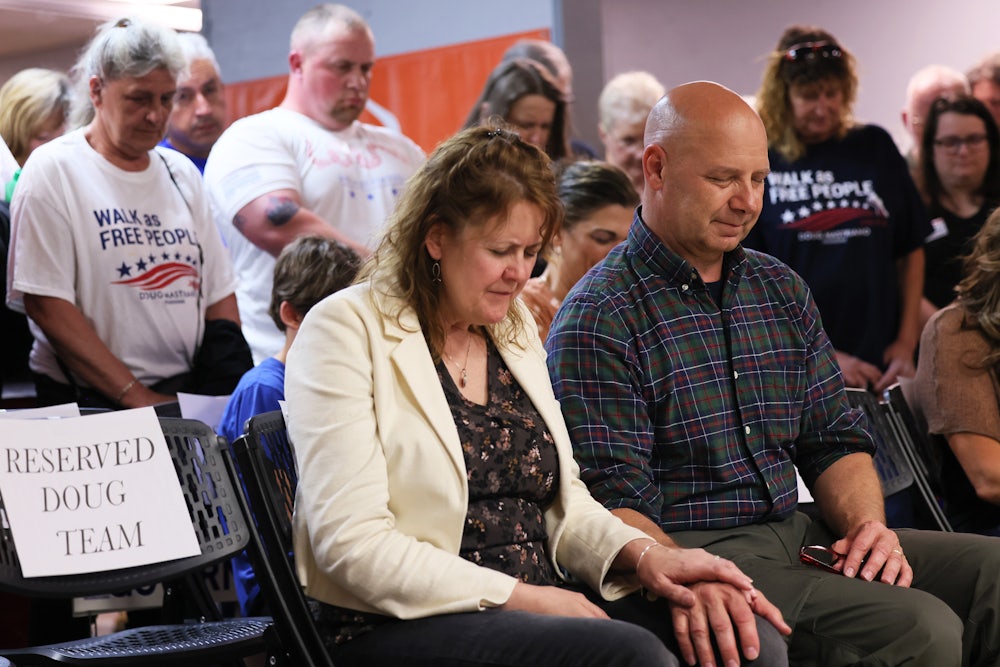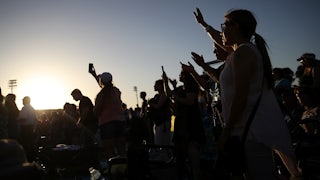If Republican candidates dominate in the 2022 midterm elections, it will have no direct effect on the price of gas or automatically solve inflation. It won’t magically reduce crime rates. But we can be sure it will advance the cause of Christian nationalism.
A Republican victory will validate the party’s strategy for packing the judiciary with radical judges. It will set the stage for national bans on abortion and same-sex marriage and further erode a range of individual rights. It will bring into Congress and state houses a host of politicians committed to conspiracism and division. It will bring joy to those who long for the day when Christians of a certain variety may impose their religious and ideological convictions on the rest of society and control all the major levers of power without fear of ever losing an election again.
So why is it that Christian nationalists are suddenly divided over whether they should be called Christian nationalists? On the one hand are candidates like GOP Georgia Representative Marjorie Taylor Greene, who said, “I’m a Christian and I say it proudly, we should be Christian nationalists.” At the latest stop on the ReAwaken America tour, a traveling road show of misinformation, the pastor and failed congressional candidate from South Carolina Mark Burns announced that he is “a proud Christian nationalist.”
On the other hand, you have candidates like Doug Mastriano, who, despite being vocally committed to a program of reactionary Christian supremacy in all things, denies that the label refers to anything real. “Is this a term you fabricated?” he asked The New Yorker journalist Eliza Griswold. Franklin Graham has flatly said, “Christian nationalism doesn’t exist.”
Leaders of the Family Research Council have taken this “What, not me” approach to an extreme. On October 12, they, along with the Regent University Robertson School of Government, organized a presentation around the proposition that the term is nothing less than a slur intended to “suppress voter turnout among Christian conservative voters.”
Which raises the question: If Christian nationalism is as wholesome as a barbecue on the Fourth of July and something to be proud of, why is it also an insult?
Let’s be clear: Christian nationalism isn’t about bringing a (purportedly) Christian viewpoint into “the public square,” as some apologists say. Nor is it relegated to irrelevant and “extreme corners” or a “virulent form of secularism,” as others suggest. It is both a set of ideas and a political movement—an organized quest for power—and it represents an existential threat to democracy in America. The leaders of the movement know this. It is many of their supporters that they are attempting to bamboozle.
The first thing to know about Christian nationalism is that it isn’t a religion. “Nationalism” is the noun here, and it refers to a political ideology. “Christian” is the modifier, and it indicates that this variety of nationalism makes selective use of Christian texts, symbols, and infrastructure for political purposes. Many if not most Christians are vehemently and vocally opposed to Christian nationalism, and many who lend their support to the movement are not Christian. Indeed, some who lend their support and funding identify with other faith traditions (see Barre Seid, who is Jewish), appear mostly committed to reactionary libertarianism (venture capitalist Peter Thiel), and do not attend church on a regular basis, if at all (a substantial minority of Trump supporters).
The other thing to remember is that nationalism is not patriotism. Patriots are loyal to the polity or collective society of which they are citizens. Nationalists care only about their ethnic, cultural, or national identity, which they take to be superior to all others, and which they wish to insert at the foundation of the civil society to which they happen to belong. In the case of the United States—perhaps the first republic in the modern world to be explicitly founded on universal ideals (however imperfectly applied), not merely national prejudices—this distinction between nationalism and patriotism makes all the difference.
The political ideology of Christian nationalism, in direct contrast with America’s founding ideals, says that government derives its legitimacy not from consent of the governed but from fidelity to the particular heritage of a particular people. As Thomas Jefferson pointed out, the American constitutional system requires a “wall of separation” between church and state. But Christian nationalists have made it clear that they intend to tear down that wall.
When their agenda comes into conflict with the requirements of constitutional democracy, movement leaders as a whole have made it clear that democracy must go. Consider movement leaders’ response to the FBI investigation of former president Donald Trump’s grotesque mishandling of classified material. In a memo released August 11, the Conservative Action Project, a group associated with the Council for National Policy, came out swinging against the American system of justice. It demanded that U.S. Attorney General Merrick Garland and FBI director Christopher Wray be “impeached and removed from public office,” asserting that their investigation amounted to “blatant politicization” and a “dangerous escalation without precedent.” Signatories included many leaders of the movement’s powerful and well-funded policy and activist groups, including Tony Perkins of the Family Research Council, Sandy Rios of the American Family Association, and Chad Connelly of Faith Wins, all of whom play outsized roles in rounding up Republican voters at election time by operating through religious infrastructure. The signatories also included leaders of the economic hard right, such as Scott Walker of Young America’s Foundation, Adam Brandon, president of Freedomworks, and Lisa B. Nelson, CEO of the American Legislative Exchange Council.
The same type of “patriot” leaders were instrumental in supporting Donald Trump’s attempted coup against the U.S. that ran from the summer of 2020 to January 6, 2021, and they continue to promote the lie about a “stolen election” on which it was based. Of the nearly 300 election deniers on the ballot in the midterm elections, 173 are running in safe Republican seats, and an additional 52 will appear in tightly contested races.
In addition, two cases heard by the Supreme Court that has been shaped by the movement are taking aim at the electoral system. Earlier this month, Alabama lawmakers argued before the Supreme Court in Merrill v. Mulligan that they have the right to bypass the Voting Rights Act, giving them license to essentially draw maps that dramatically disfavor voters of color. And an upcoming case, Moore v. Harper, centers on a gerrymandered map in North Carolina and could give Republicans an overwhelming advantage, even when Democrats win states by clear margins. A ruling for the plaintiffs could give states full authority over elections without federal oversight.
How do leaders of the Christian nationalist movement attempt to finesse this contradiction between their red-white-and-blue patriotism and their support for the destruction of America’s democratic institutions?
The less polished representatives of the movement don’t attempt to finesse it at all. Lauren Boebert, the representative from Colorado, says she is “tired” of the separation of church and state. Andrew Torba, the founder and CEO of Gab, co-wrote and self-published Christian Nationalism: A Biblical Guide for Taking Dominion and Discipling Nations, which argues for the creation of “a parallel Christian society” to replace “the failed secular state.” And The Case for Christian Nationalism, a new title from Canon Press, which is associated with Douglas Wilson, the reactionary preacher and slavery apologist from Moscow, Idaho, advocates “the institutionalization of Christianity.”
More savvy movement leaders resort to sophisms. Sure, the Constitution prohibits the establishment of religion and sustains a right to the free exercise of any religion or none, they say. But those rights are supposedly justified or based on a reactionary reading of the Christian religion—or as they sometimes misleadingly put it, the “Judeo-Christian” tradition. What is that to mean, if not that conservative Christians are more equal than non-Christians or Christian progressives?
A recent survey from Pew helps explain the need for this kind of double-talk. When asked whether the Constitution calls for the separation of church and state, 73 percent of Americans said it does, proving perhaps that a good number stuck it out through high school history class. When asked whether they would like to keep the separation of church and state, however, only 34 percent of Republicans said they would. In other words, a substantial number are consciously committed to a Christian nationalist program that involves rejecting the Constitution for some form of divinely-inspired government. The remainder, however, is divided between those who are confused about the Constitution and those who reject unconstitutional religious nationalism.
It is that faction of Republican voters, that 34 percent, that has induced movement leaders to engage in word games about the term that best describes them. They know their power depends on the votes of many individuals who are not as radical as they are. These supporters value their public schools and like, or at least “tolerate,” their gay neighbors; they just want to have a certain identity reaffirmed. If exposed to the reality about the party and movement they support, they might not be along for the ride.
So what are the leaders to do? True to form, the Family Research Council and their allies have decided to reframe the critique of their authoritarian political ideology as an attack on Christianity itself. Nothing serves religious nationalism better than the conviction that its members are under constant persecution. Like their chosen hero of the moment, Donald Trump, the champions of Christian nationalism are seeking to convert exposure of their actual aims into evidence of their innocence.
The subterfuge over labels doesn’t change the nature of the threat to our democracy. If Republicans sweep to power in the U.S. Congress and state houses, we can be sure that they will pursue the authoritarian agenda laid out for them by the Christian nationalist movement’s leadership and its allies.






